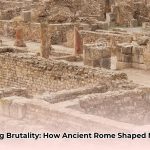Ever considered how ambition, immense wealth, and esteemed lineage intertwined to shape the lives of Ancient Rome’s elite? Figures like Marcus Licinius Crassus, a man of unparalleled wealth and political shrewdness, offer a profound lens into the power dynamics and societal expectations placed upon the Roman nobility. Was Crassus merely a self-serving opportunist, or an astute player within a system inherently designed for the privileged? His intricate life story, alongside broader shifts in social hierarchy, provides critical insights into the very foundations of Roman governance and its evolving class structure. Understanding their journey reveals much about the timeless interplay between individual drive and historical context. Further examination into Roman social class offers a deeper understanding.
The Patrician Pedigree and Early Ascensions
Access to Roman high society was initially dictated by birthright, with prominent families holding immense sway over the emerging Republic. The patricians, deriving their name from the “fathers” (Latin patres) who served as the first senators appointed by Romulus, formed Rome’s original ruling class. Their status granted exclusive access to political offices, religious priesthoods, and prime land. For individuals like Marcus Licinius Crassus, hailing from a distinguished gens (clan or family) provided an invaluable initial advantage, offering both inherited wealth and crucial connections that facilitated his early career. In ancient Rome, one’s genealogy was a powerful currency, unlocking doors to political office and substantial social influence. However, simply possessing noble lineage was rarely sufficient; an individual’s relentless drive to navigate the complex social and political landscape of the Republic was equally, if not more, vital for true prominence. Crassus’s extraordinary ascent exemplifies a potent blend of inherited privilege and personal ambition.
Marcus Licinius Crassus: A Study in Roman Ambition
Crassus’s early life was framed by the expectations of his gens, which demanded public service and military distinction. The Roman cursus honorum (sequence of public offices) was the prescribed route to prestige, and noble birth provided a significant head start. This system, integral to the Roman Republic’s governance, ensured that the state’s leadership emerged from a pool of individuals prepared by both education and experience, often from the senatorial class. Crassus meticulously followed this path, demonstrating that traditional pathways, while open by birth, required rigorous commitment and strategic maneuvering for success.
The Pursuit of Power: Political Acumen and Public Office
The trajectory of a Roman nobleman like Crassus vividly demonstrates how political positions were not merely symbolic titles but potent instruments for shaping and dominating Roman society. Crassus’s political career, marked by shrewd maneuvers and a keen understanding of Roman political mechanics, showcased the essential skills required for wielding public influence. His decisive, albeit controversial, role in quelling the formidable slave revolt led by Spartacus significantly elevated his public perception and bolstered his political standing. He masterfully leveraged his vast personal wealth to forge strategic alliances, pay off debts of influential senators, and sway critical decisions within the Roman Senate, illustrating that political sagacity was paramount, even for those born into privilege. His actions reveal the high stakes of Roman political ambition, where triumph could lead to unprecedented power, but missteps could be fatal.
Wealth as the Cornerstone of Influence
Economic prowess was inextricably linked to social and political leverage throughout the Roman Republic. Crassus’s immense fortune, primarily derived from extensive land ownership, served as the bedrock of his influence. His vast estates generated substantial income, which he astutely reinvested into various profitable, though often ethically ambiguous, ventures. Notably, he established Rome’s most effective private firefighting service. When fires broke out, his trained slaves would rush to the scene, but only after Crassus or his agents negotiated the purchase of the burning property, often at a distressed price, before extinguishing the blaze. He also amassed wealth through slave trading, buying unskilled bondsmen, training them, and reselling them for considerable profit. This strategic control over vital resources directly translated into significant political leverage among the Roman aristocracy. This concentration of wealth among the elite, while empowering individuals, also fueled underlying social tensions within the wider Roman society, exacerbating the divide between the affluent and the struggling commoners.
Military Service and the Roman Ethos of Virtus
For the Roman noble, military service represented both an expected civic duty and a critical pathway for societal advancement and recognition. For Crassus, leading legions during the Spartacus revolt, despite some debated tactical decisions, solidified his reputation as a capable military commander. This commitment to military duty embodied virtus (manly excellence), a core Roman concept that encompassed courage, intelligence, and discipline, defining an honorable aristocrat. While Crassus certainly exhibited intelligence and strategic acumen in his business and political dealings, his relentless pursuit of wealth and power sometimes stretched the boundaries of conventional Roman ethics and perhaps compromised the ideal of virtus. This constant tension between personal ambition and public virtue remains a point of considerable debate among classical scholars.
From Plebeian Roots to the Nobiles: Redefining Roman Nobility
Initially, Roman society was rigidly stratified, with patricians monopolizing political power, religious authority, and economic advantages. However, the path for plebeians, the common citizens, to ascend to noble status was forged through centuries of determined struggle during the Conflict of the Orders (494 BC to 287 BC). Plebeians famously employed secessions—mass walkouts where they withdrew from the city, effectively halting its operations—to exert pressure, forcing patricians to negotiate and concede rights. This powerful form of collective action historically proved instrumental in achieving significant social change.
A pivotal early victory was the codification of Roman law into the Twelve Tables around 451 BC, providing transparency and a measure of protection previously absent for plebeians. These landmark legal reforms, despite some inherent biases, were instrumental in leveling the legal playing field. The Lex Canuleia (445 BC) repealed the prohibition on marriage between plebeians and patricians, further blurring traditional class lines and allowing successful plebeian families to integrate into the Roman elite. Access to high political offices, once exclusive to patricians, gradually opened to plebeians with laws like the Leges Liciniae Sextiae (367 BC), which mandated that one of the two consuls must be a plebeian. The Lex Ogulnia (300 BC) granted plebeians access to priestly colleges, eroding the patricians’ religious monopoly. This series of concessions culminated in the Lex Hortensia (287 BC), a transformative law that granted plebiscites (laws passed by the plebeian council) the full force of law, binding all Roman citizens. This fundamentally altered the power balance, shifting legislative authority.
This evolution did not create a perfectly egalitarian society, but rather led to the emergence of the nobiles—a new elite class comprised of both patricians and highly successful plebeians who had achieved prominence through holding high political office. By the late Republic, family history of holding magistracies, not strictly patrician birth, defined nobility. Thus, the path for plebeians to achieve nobility was forged through sustained political pressure, strategic advancement, and a series of foundational legal reforms.
Lessons from Roman Grandeur and Its Downfalls
Crassus’s extraordinary life, marked by immense wealth accumulation and significant political influence, ultimately culminated in a devastating military defeat at the Battle of Carrhae in 53 BC. This catastrophic outcome, where Crassus himself was killed, stands as a stark consequence of his unchecked ambition and insatiable desire for further military glory. His demise serves as a compelling reminder that the pursuit of absolute power, without proportional wisdom or a realistic assessment of risks, often leads to catastrophic misjudgment. While some historians attribute his overconfidence to prior political successes, others point to flawed planning and intelligence gathering as primary causes.
The narrative of Crassus, alongside the broader evolution of Roman class structures, yields vital lessons for contemporary understanding:
- Navigating Unchecked Power: Excessive power, even within a seemingly balanced system like the Roman Republic, can cloud judgment and lead to critical errors. Crassus’s personal hubris in Syria, despite his vast experience, illustrates how concentrated power without sufficient checks and balances can be perilous for both the individual and the state.
- The Double-Edged Sword of Ambition: Ambition, while a powerful motivator for individual achievement and societal progress, requires balance with ethical conduct, sound judgment, and an awareness of limitations. Crassus’s relentless drive for more wealth and military glory ultimately led to his downfall, demonstrating that uncontrolled ambition can be self-destructive.
- Crafting a Lasting Legacy: True legacy transcends mere wealth or transient political power. It is often forged through meaningful, enduring contributions to society or a commitment to principles beyond personal gain. While Crassus achieved great wealth and influence, his legacy is often overshadowed by his ignominious end and the ethically questionable means he employed.
- Equity in Political Access: The Roman experience, particularly the centuries-long Conflict of the Orders, highlights how social class profoundly influences access to power and opportunity. The gradual, hard-won advancements of the plebeians underscore the ongoing need for equitable political participation, demonstrating its positive impact on the long-term stability and cohesion of a society.
By meticulously dissecting the lives of figures like Crassus and tracing the historical transformation of Roman society, we gain a deeper, more nuanced understanding of political power, its complex applications, and its potential abuses. Such studies remain remarkably relevant, offering critical historical context that helps us navigate the challenges inherent in our own evolving political and social landscapes today.










